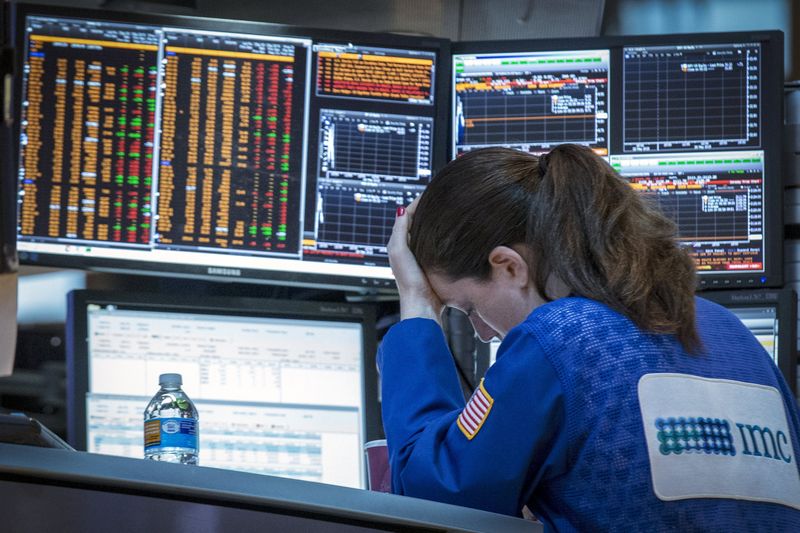By Geoffrey Smith
Investing.com -- The latest $484 billion U.S. economic support package will be signed by President Trump later, after the House ratified by a large, bipartisan majority. Stocks are set to open a little higher, recovering after Gilead Sciences (NASDAQ:GILD) deflated hopes for a quick cure to the Covid-19 virus. The euro hit a one-month low after EU leaders fell out again over the shape and size of its recovery plan for the economy, while U.K. retail sales and German business confidence fell by the most on record. Oil, however, has stabilized,partly because brokerages are making it harder for clients to bet on it after this week's shenanigans. Here's what you need to know in financial markets on Friday, 24th April
1. Stimulus bill passes; Mnuchin eyes support for oil industry
The latest $484 billion economic support bill, which tops up the Paycheck Protection Program for small businesses and also channels extra funds to hospitals and testing, will be signed by President Donald Trump after passing the House of Representatives with bipartisan vote late on Thursday.
Meanwhile, Treasury Secretary Steven Mnuchin told Bloomberg in an interview that the administration is looking at setting up a lending facility specifically for the oil and gas industry to help it through the current extraordinary volatility.
He added that he's looking at a lot of different options and has not made any conclusions. House Democrats blocked Mnuchin’s proposals to support the domestic oil industry through purchases for the Strategic Petroleum Reserve in an earlier stimulus bill.
2. Grim data as Europe fails to agree on a recovery plan
The U.K.’s retail sales fell by the most ever in March, while Germany’s closely-watched Ifo business climate index also slumped to its lowest ever in April, data out Friday showed.
The news came on top of fresh disappointment at European leaders’ failure to craft a convincing policy response to the economic crisis fast unfolding. An EU summit on Thursday agreed in principle to establish a ‘recovery fund’ but couldn’t agree on how to finance it, or how big it should be.
The combination of news pushed European stock markets lower and sovereign bond spreads wider. Italy in particular is in the spotlight as Standard & Poor’s is widely expected to cut its long-term rating after the close today. At BBB, the rating is currently two notches above junk.
The euro fell to a one-month low of $1.0727 earlier before recovering slightly.
3. Stocks set to open higher despite lingering drug disappointment
U.S. stock markets are set to open higher, recovering from Thursday's disappointment regading a possible cure to the Covid-19 coronavirus.
By 6:20 AM ET (1020 GMT), the Dow Jones 30 Futures contract was up 98 points, or 0.4%, while the S&P 500 was up 0.5% and the Nasdaq 100 futures contract was up 0.3%.
Gilead Sciences pushed back on Thursday against a report alleging that the first results of tests examining the usefulness of its experimental drug remdesivir in treating Covid-19 had been negative. Gilead styled the trial ‘inconclusive’.
The market had withstood another miserable week of initial jobless claims before Gilead’s news, suggesting that it shouldn’t get too bent out of shape by durable goods orders and consumer sentiment data at 8:30 and 10 AM, respectively.
4. Chipmaker down after pulling guidance; More telecom and bank earnings due
Intel stock fell 4.5% in premarket trading after the company pulled its guidance for the year, despite beating expectations in the first quarter. The stock is being buffeted by reports that Apple (NASDAQ:AAPL) is set to drop its chips from the next generation of Mac computers next year.
E-Trade and Capital One may also come under pressure at the open after missing expectations in their updates after the closing bell on Thursday.
Today’s earnings roster is headed by Verizon and American Express both reporting before the open.
5. Oil stabilizes as brokers tighten their rules
Oil prices settled into a range after an unprecedented week of volatility, as technical pressures arising from the expiry of May futures contracts eased. There was no major news to change the short-term supply-demand outlook.
By 6:10 AM, U.S. crude futures were down 2.2% at $16.14 a barrel, while Brent futures were down 0.2% at $21.29 a barrel. Both blends are still down by over 60% from the start of the year, however.
TD Ameritrade (NASDAQ:AMTD) and other retail brokerages have taken action to stop clients building new positions in both benchmarks, while some have also raised margin requirements.
““Given the extreme and unpredictable volatility in the markets, we are taking action to protect our smaller clients and make sure they are aware of the risks they are assuming,” Reuters quoted a spokesman for brokerage INTL FCStone as saying.
